#bahrain spring of culture
Text
Bahraini spring🌻
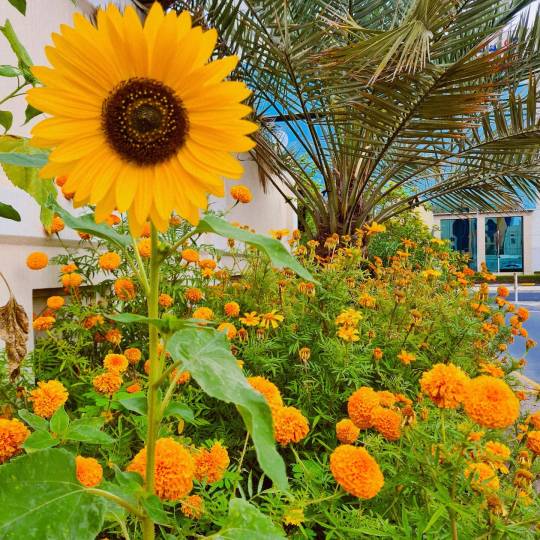
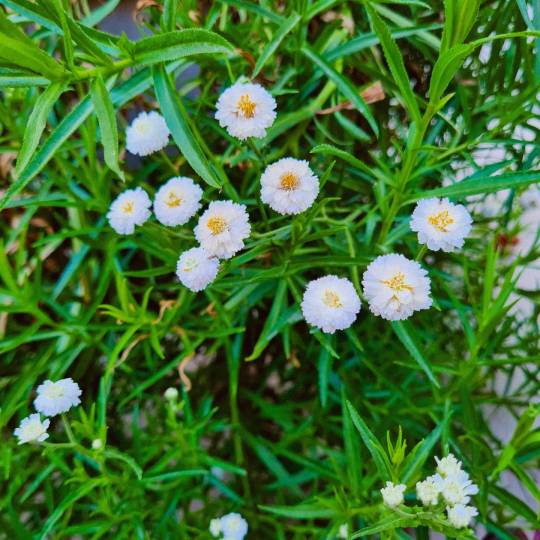
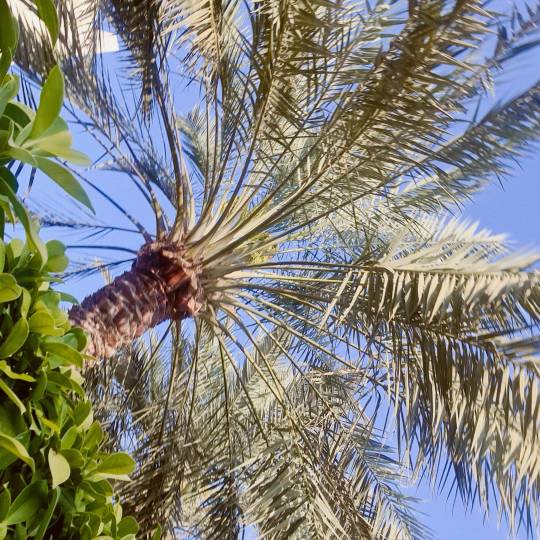
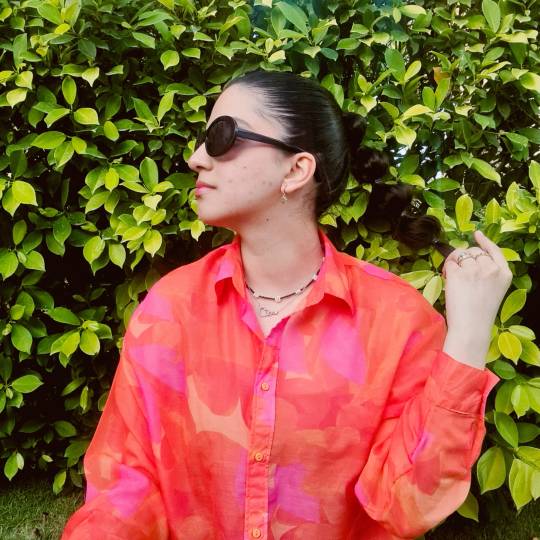
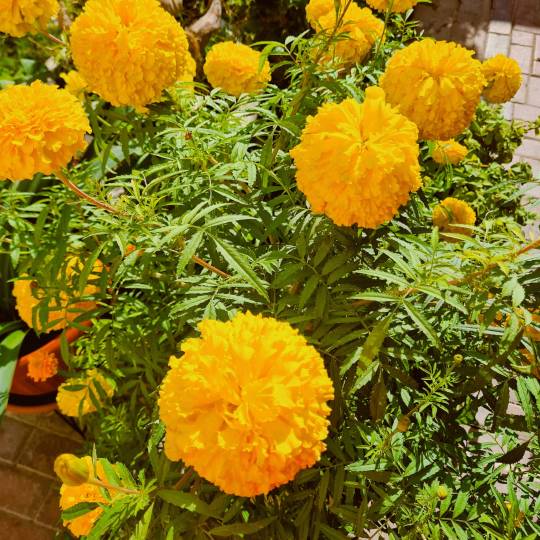

#spring#spring vibes#spring aesthetic#spring season#spring flowers#flowers#flower#flower aesthetic#aesthetic#sunflower#sunflowers#lavendar#bahrain#bh#2023#spring 2023#spring of culture#bahrain spring of culture#pink#pinks#orange#oranges#vibes#vibing
10 notes
·
View notes
Text
HWS Asia Week will be hosted from July 8th-17th of 2024!!
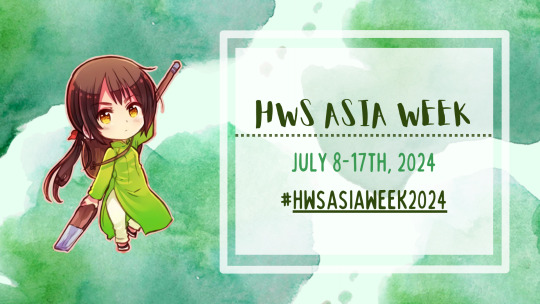
Three prompts per day:
1) nations from Asia
2) a general theme
3) a quote
You can choose which prompt or prompts you want to create content for; you can stick with one country (canon or OC) throughout the whole week or switch between multiple; it's all up to you!
Any form of content is accepted, including but not limited to: fanfiction, fanart, AUs,headcanons, aesthetics, etc.
Prompts:
Day 1 (Jul 8): Mongolia || Culture/Traditions || "Look how we bleed from all this wanting"
Day 2 (Jul 9): Taiwan, Indonesia, Uzbekistan|| Food || "A smooth sea never made a skillful sailor"
Day 3 (Jul 10): India + China || History || "Come, Dance with me"
Day 4 (Jul 11): South Korea, Laos, Bahrain || Fantasy || "I ache in a language so old that even the earth no longer remembers"
Day 5 (Jul 12): Persia/Iran || Folklore/Legends/Myths || "Having the same enemy does not make us friends"
Day 6 (Jul 13): Hong Kong || Daily Life || "No one wearing a crown comes in the name of peace"
Day 7 (Jul 14): Malaysia + Indonesia || Flowers/Garden || “War is sweet to those who have never fought”
Day 8 (Jul 15): Macau, Philippines, Japan || Story/Storytelling || "The relief of giving into destruction"
Day 9 (Jul 16): Kazakhstan, Lebanon, Singapore|| Tea/Coffee || "I promise spring is coming / and with it, brand new leaves"
Day 10 (Jul 17): Free Day
Rules:
Rule Post
Follow this account
No NS//FW
Tag your content with #hwsasiaweek2024 and @ this account please!
Ships and content with other non-Asian nations are allowed, but please try to give equal weight to the Asian character in the ship,since this is an event celebrating the Hetalia Asians.
Gore/blood/dark topics allowed; they will be tagged with #tw _
Don't be a clown and make racist content
Use common sense and nuance when touching upon sensitive political subjects.
FAQ
Have Fun!
@hetaliahappenings @heta-on-the-books @hetaliacalendar
#hetalia#hws asians#aph asean#hws asean#aph china#hws china#aph japan#hws japan#aph hong kong#hws hong kong#aph korea#hws korea#aph south korea#hws south korea#aph taiwan#hws taiwan#aph vietnam#hws vietnam#aph india#hws india#aph indonesia#hws indonesia#aph philippines#hws philippines#aph bangladesh#hws bangladesh#hwsasiaweek2024#aph bhrutan#aph nepal#aph mongolia
134 notes
·
View notes
Text
11.20.22 Headlines
WORLD NEWS
Turkey: Strikes in Syria, Iraq a week after Istanbul bombing (AP)
“Turkey launched deadly airstrikes over northern regions of Syria and Iraq, the Turkish Defense Ministry said Sunday, targeting Kurdish groups that Ankara holds responsible for last week’s bomb attack in Istanbul. The airstrikes came after a bomb rocked a bustling avenue in the heart of Istanbul on Nov. 13, killing six people and wounding over 80 others. Turkish authorities blamed the attack on the PKK and its Syrian affiliate the YPG. The Kurdish militant groups have, however, denied involvement.”
Qatar: World Cup opens with message of inclusion (AP)
“The opening ceremony was meant to introduce Qatar to the world through its culture with a theme of “bridging distances.” Creative director Ahmad Al Baker wanted the ceremony to signify “a gathering for all mankind, an invitation to come together as one, bridging all differences with humanity, respect and inclusion.” It hit the mark when Sheikh Tamim was joined in the stadium suite by Saudi Crown Prince Mohammed bin Salman and Egyptian President Abdel Fattah el-Sissi, two leaders who had boycotted Qatar for years. Not present were the leaders of Bahrain and the United Arab Emirates, the two other nations involved in the boycott.”
UN Climate Deal: Calamity cash, but no new emissions cuts (AP)
“For the first time, the nations of the world decided to help pay for the damage an overheating world is inflicting on poor countries, but they finished marathon climate talks on Sunday without further addressing the root cause of those disasters — the burning of fossil fuels. The deal, gaveled around dawn in this Egyptian Red Sea resort city, established a fund for what negotiators call loss and damage.”
US NEWS
Gun Violence: Gunman kills 5 at gay nightclub, subdued by patrons (AP)
“A 22-year-old gunman opened fire in a gay nightclub in Colorado Springs, killing five people and injuring 18 before he was subdued by “heroic” patrons and arrested by police who were on the scene within minutes, authorities said Sunday. Two firearms, including a “long rifle,” were found at Club Q after the Saturday night shooting, said Police Chief Adrian Vasquez.”
Crime: University of Idaho students stabbed to death in their beds (BBC)
“Nearly a week after four University of Idaho students were found dead in their rental home, a coroner has revealed they were stabbed in their beds. The three young women and young man were probably sleeping when they were attacked on Sunday 13 November, said Latah County Coroner Cathy Mabbutt. They were stabbed multiple times with a "pretty large knife", she added. No arrests have been made and police in the college town of Moscow have warned the killer may still pose a threat.
Education: What to know if you’ve applied for student loan forgiveness (AP)
“President Joe Biden’s plan to provide up to $20,000 in federal student loan forgiveness has been blocked by two federal courts, leaving millions of borrowers wondering what happens next. The Justice Department on Friday asked the Supreme Court to reverse one of the lower court decisions, warning that many Americans will face financial hardship if the plan remains blocked.”
#curent events#news#turkey#syria#iraq#qatar#world cup#united nations#climate change#climate crisis#global warming#gun violence#lgbtq#crime#education
4 notes
·
View notes
Text
Multimedia Journal #3: Tawakkol Karman
Tawakkol Karman is a Yemeni female, a Nobel Peace Laureat, and activist who fought against cultural pressure to not speak up in a moment where she neeeded to. Yemeni culture tends to shush women, not all the time, but especially for a woman being in the public eye, it's seen as not her place. However, Karman fought against this, she took off her niqab (which is a personal choice, but also the region she originates from is not as strict about wearing it like other regions of Yemen are. She became one of many faces during the Arab Spring Revolution that took place all over the Middle East-North African region in 2011 - her being in Yemen. A time where people from all ME/NA countries were fed up with the political greed, oppression, and exploitation going on. An uprising that spread like fire with the use of Facebook, starting in Tunisia, and going on in Yemen, Egypt, Bahrain, Syria, and other countries.
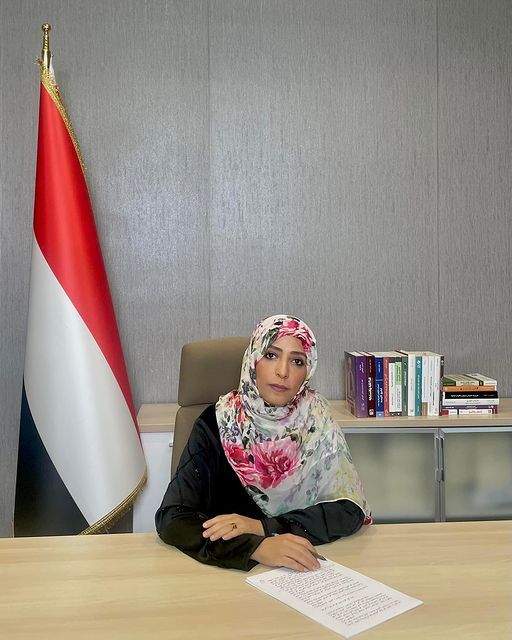
Tawakkol Karman
Tawakkol's story reminds me of the Chicana feminist movement. How women strove against the pressure to stay quiet, how they're expected to sit silently and suffer. Tawakkol not only stood up for Yemenis, but she gave Yemeni women a voice. To speak up against what's wrong, to fight for their rights, and to not be quiet if the flame within you is burning for you to speak loudly.
References
instagram
0 notes
Text
Arab Spring

The Arab Spring was a series of pro-democracy uprisings that enveloped several largely Muslim countries, including Tunisia, Morocco, Syria, Libya, Egypt and Bahrain. The events in these nations generally began in the spring of 2011, which led to the name. However, the political and social impact of these popular uprisings remains significant today, years after many of them ended.
The Arab Spring was a loosely related group of protests that ultimately resulted in regime changes in countries such as Tunisia, Egypt and Libya. Not all of the movements, however, could be deemed successful—at least if the end goal was increased democracy and cultural freedom. In fact, for many countries enveloped by the revolts of the Arab Spring, the period since has been hallmarked by increased instability and oppression. Given the significant impact of the Arab Spring throughout northern Africa and the Middle East, it’s easy to forget the series of large-scale political and social movements arguably began with a single act of defiance.
The Arab Spring began in December 2010 when Tunisian street vendor Mohammed Bouazizi set himself on fire to protest the arbitrary seizing of his vegetable stand by police over failure to obtain a permit. Bouazizi's sacrificial act served as a catalyst for the so-called Jasmine Revolution in Tunisia. The street protests that ensued in Tunis, the country’s capital, eventually prompted authoritarian president Zine El Abidine Ben Ali to abdicate his position and flee to Saudi Arabia. He had ruled the country with an iron fist for more than 20 years. Activists in other countries in the region were inspired by the regime change in Tunisia—the country’s first democratic parliamentary elections were held in October 2011—and began to protest similar authoritarian governments in their own nations. The participants in these grassroots movements sought increased social freedoms and greater participation in the political process. Notably, this includes the Tahrir Square uprisings in Cairo, Egypt and similar protests in Bahrain. However, in some cases, these protests morphed into full-scale civil wars, as evidenced in countries such as Libya, Syria and Yemen.
The name "Arab Spring” is a reference to the Revolutions of 1848—also known as the “People’s Spring”—when political upheavals swept Europe. Ever since, “spring” has been used to describe movements toward democracy like Czechoslovakia’s 1968 “Prague Spring.” Western media began popularizing the term “Arab Spring” in 2011. While the uprising in Tunisia led to some improvements in the country from a human-rights perspective, not all of the nations that witnessed such social and political upheaval in the spring of 2011 changed for the better. Most notably, in Egypt, where early changes arising from the Arab Spring gave many hopes after the ouster of President Hosni Mubarak, authoritarian rule has apparently returned. Following the controversial election of Mohamed Morsi in 2012, a coup led by defense minister Abdel Fattah El-Sisi installed the latter as president in 2013, and he remains in power today.
In Libya, meanwhile, authoritarian dictator Colonel Muammar Qaddafi was overthrown in October 2011, during a violent civil war, and he was tortured (literally dragged through the streets) and executed by opposition fighters. Video footage of his death was seen by millions online. However, since Qaddafi’s downfall, Libya has remained in a state of civil war, and two opposing governments effectively rule separate regions of the country. Libya’s civilian population has suffered significantly during the years of political upheaval, with violence in the streets and access to food, resources and healthcare services severely limited. This has contributed, in part, to the ongoing worldwide refugee crisis, which has seen thousands flee Libya, most often by boat across the Mediterranean Sea, with hopes of new opportunities in Europe.
Spring lasted for several years, forcing many to leave the country to seek refuge in Turkey, Greece and throughout Western Europe. For a time, the militant group ISIS had declared a caliphate—a nation governed by Islamic law—in northeastern Syria. The group executed thousands of people, and many others fled the region in fear of their lives. Yet, although ISIS has largely been defeated in Syria, the oppressive regime of long-time dictator Bashar al Assad remains in power in the country. In addition, the ongoing civil war in Yemen can also be traced to the Arab Spring. The country’s infrastructure has suffered significant damage, and the conflict has devolved into tribal warfare. And in Bahrain, peaceful pro-democracy protests in the capital Manama in 2011 and 2012 were violently suppressed by the government of King Hamad bin Isa Al Khalifa. Officially, the country has a constitutional monarchy form of government, but personal freedoms remain limited.
Here are the key events in the Arab Spring, in chronological order:
December 17, 2010: Mohamed Bouazizi sets himself on fire outside a local government office in an act of protest after being arrested by police for not having a permit to run a vegetable stall. Street protests begin soon after his death throughout the country.
January 14, 2011: Tunisian president Zine El Abidine Ben Ali resigns and flees to Saudi Arabia.
January 25, 2011: The first coordinated mass protests are held in Tahrir Square in Cairo, Egypt.
February 2011: Protestors in several predominantly Muslim countries stage “Days of Rage” to oppose authoritarian governments and push for democratic reforms.
February 11, 2011: Egypt’s Mubarak steps down.
March 15, 2011: Pro-democracy protests begin in Syria.
May 22, 2011: Police beat thousands of pro-democracy protesters in Morocco.
July 1, 2011: Moroccan voters approve constitutional changes that limit the power of the country’s monarchy.
August 20, 2011: Rebels in Libya launch battle to take control of Tripoli.
September 23, 2011: Yemenis hold a “Million Man March,” a large-scale pro-democracy protest.
October 20, 2011: Libyan dictator Colonel Muammar Qaddafi is captured by rebels, tortured and killed.
October 23, 2011: Tunisia holds first democratic parliamentary elections.
November 23, 2011: Yemen dictator Ali Abdullah Saleh signs a power-sharing agreement. He resigns altogether in February 2012 and is later killed, in 2017, while the country is still engulfed in a civil war.
November 28, 2011: Egypt holds first democratic elections for parliament. In June 2012, Morsi is elected president, but is removed from power by coup in July 2013.
1 note
·
View note
Text
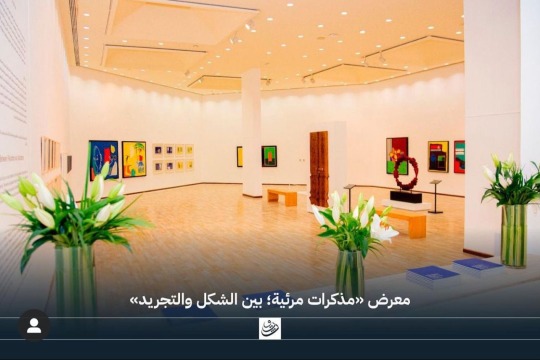
Project 1, FA222, Detailed critical coverage of exhibitions.
DR. Ehab Juma
On Tuesday, March 1, 2022, the Arts Center witnessed the opening of the exhibition "Visual Notes: Between Form and Abstraction" by Bahraini artist Rashid Ahmed Al-Arifi, in the presence of Sheikha Hala bint Mohammed Al Khalifa, Director General of Culture and Arts at the Bahrain Authority for Culture and Antiquities, and a number of artists, cultural figures and those interested in cultural affairs in the Kingdom of Bahrain.
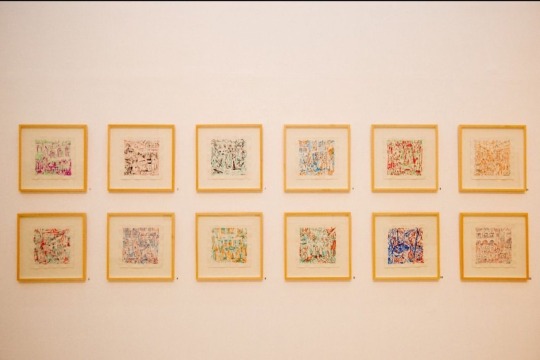
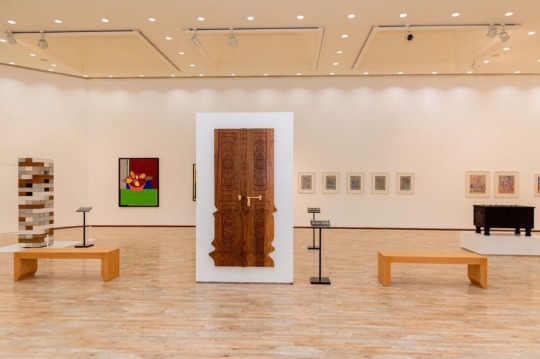
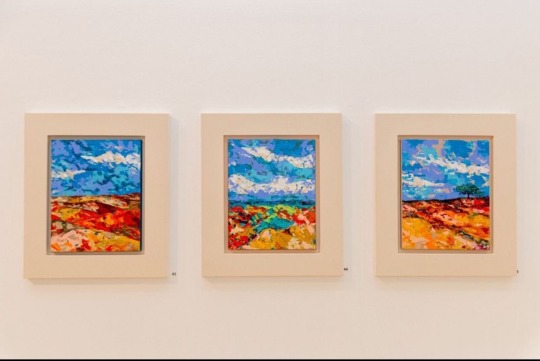

The exhibition This exhibition is part of the activities of the 16th Spring Culture Festival, and it will continue at the Arts Center until the end of this March from 9:00 am to 8:00 pm.
The Culture Authority is holding this exhibition in appreciation of the artist Al-Arifi winning the second prize at the Bahrain Annual Fine Arts Exhibition for the year 2020 AD for the artwork “Culture of a Classified Company”.
The artist Rashid Ahmed Al-Arifi thanked the Bahrain Authority for Culture and Antiquities for the poets in order to promote the artistic movement in Bahrain, a picture of a name belonging to the Kingdom of Bahrain. He said, "It is considered that her knowledge is from the outside
It indicates that the artistic elements that do not depend on the linear narrative, refer to figures, and events, and draw inspiration from scattered excerpts from Bahraini culture and heritage. The artist Al-Arifi hoped that the exhibition would be admired by the art connoisseur in Bahrain and that the viewer would coexist with the narrative scenes around which the works revolve.
It is noteworthy that the artist Rashid Ahmed Al-Arifi is an architect, designer, and plastic artist who uses visual narration in his artworks of all kinds. It also belongs to the artistic community, as his uncle, the late artist Rashid Al-Arifi. Rashid Ahmed Al Arifi style by many Bahraini and international artists such as Jork Kondo, Salvador Dali, Mark Rotko, Joan Miro, and Takashi Murakami. Participated in art fairs for local and international fairs to exchange information and science fairs.
It is worth mentioning that the Spring of Culture Festival is being held this year by the Bahrain Authority for Culture and Antiquities, the Sheikh Ibrahim Center for Culture and Research, and Al Dana Theatre, in cooperation with Al Riwaq Space for Arts and Al Bareh for Fine Arts. Where a year reads to the public a general program in 1992. A year and a year of entertainment games, exhibitions, lectures, exhibitions, and international shows that suit different tastes and ages and bridges of cultural and human communication between the Kingdom and the world.
@uob-funoon
9 notes
·
View notes
Note
girl the USA Isn't committing military 'imperialism' against rich western nations who are its allies by having english parasitize other languages and american culture be spread out and integrated into other cultures. there are real victims of US imperialism whose death toll is something other than the beauty of language and art. and likewise, muslims in europe are also modifying the local culture and language (IMO for the worst). no military power either.
first of all......:

second of all, learn what imperialism means. i made no mention of the military to begin with:

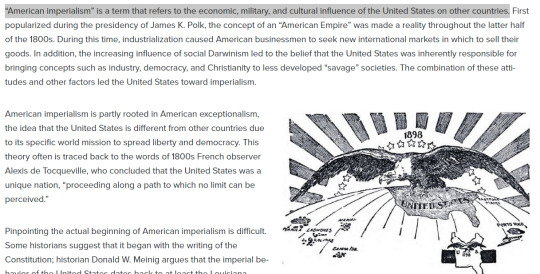
and yeah i know the 'real victims of US imperialism', maybe u should go look into bahrain's arab spring and how the US was involved before lecturing me.
as for 'muslims are modifying the culture and language' .. lol.
#can u guys stop annoying me with ur boohoo i hate middle easterners theyre actually bad and oppressing europeans simply by existing in#europe messages. like its rly gotten old months back and u guys constantly feel the need 2 repeatedly argue this with me
7 notes
·
View notes
Text
Jason Derulo was lit🔥
0 notes
Link
ABU DHABI, United Arab Emirates — Israel and the United Arab Emirates were never at war, but the normalization of ties between these two countries, which is advancing at a dizzying pace, promises to become a very warm peace. At least that’s the impression the Israeli delegation to the Gulf country got on its historic first day here Monday.
As soon as we stepped out of the Boeing 737-900 onto the Abu Dhabi tarmac and into the 44°C afternoon heat, we Israelis visitors were all treated like honored guests.
There were Israeli flags waving alongside the American and the Emirate ones in the airport terminal.
On the journalists’ bus, bottles of water and orange juice and cookies made in Oman were waiting.
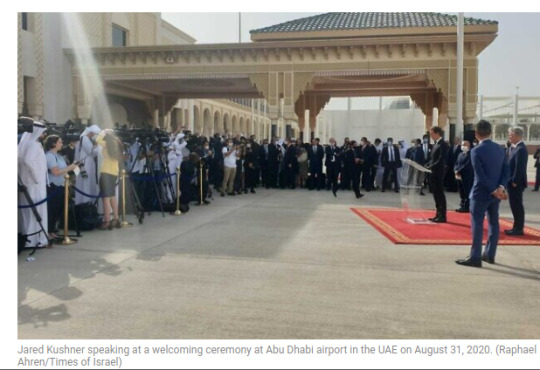
And our fast-moving motorcade — the bus for us reporters, some vans and limos for the genuine VIPS — was escorted to the hotel by local police cars, who honked brusquely whenever anyone else came too close to us on the road and might have slowed us down.
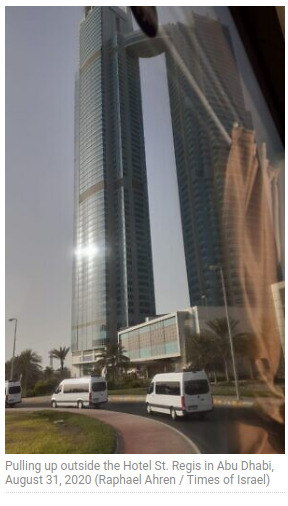
This is not the norm for visits of this Israeli level in most other parts of the world. It was not, after all, a state visit by Prime Minister Benjamin Netanyahu, or even a working visit by a foreign minister.
But we were making history — as the Israeli part of a US-Israeli delegation headed by US President Donald Trump’s senior advisor Jared Kushner and the US and Israeli national security advisers, joined by the directors-general of Israeli ministries and other Israeli officials seeking to lay the groundwork for thriving diplomatic relations.
And our hosts wanted to ensure that we felt wanted and welcome.
When I entered my room on the 37th floor of the city’s magnificent St. Regis hotel, I found some exquisite baked goods and several other gifts in a bag with the UAE’s official emblem on it.
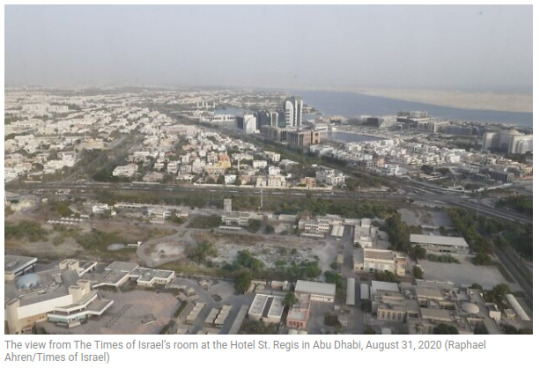
It contained a locally made dark amber and cardamon-scented candle, a jar of raw organic samr honey, and a rabaah — a spike fiddle traditionally used by nomadic Bedouins — in a fine leather bag.
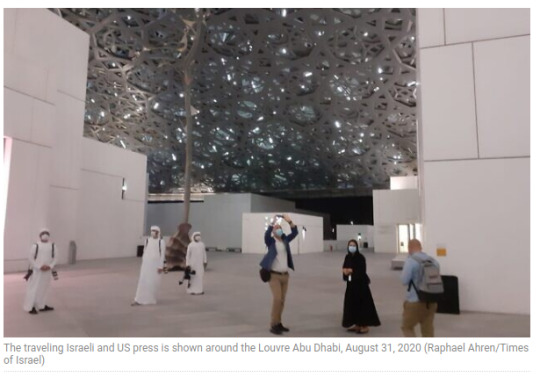
In the evening, the traveling press was invited to a quick tour of the Abu Dhabi Louvre, a sprawling branch of the Parisian museum.
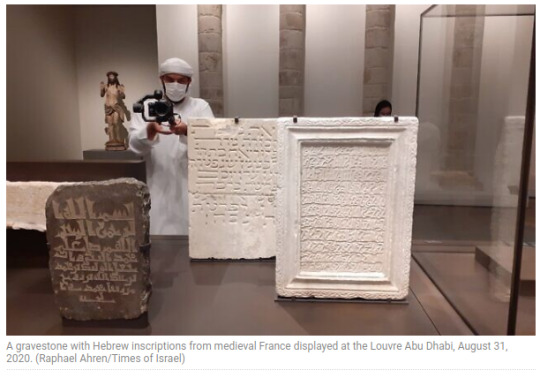
The message to us was clear: The UAE is modern, tolerant and open — you Israelis can feel comfortable about the budding peace between us.
After the quick museum tour, we were treated to a banquet dinner, with four off-record briefings from prominent Emirati officials who talked to us about Emirati culture, society and history. Besides the speakers, our hosts invited Emiratis from various walks of life to chat with us during dinner — and all of them hailed the normalization agreement with Israel, and looked forward to the ceremony formalizing ties, and deepening relations to follow. The Middle East has seen too much conflict, and it’s time for a paradigm change, they said.
“We could not be happier to have you all here,” said one of those who spoke to us, and it didn’t feel forced. “I’m literally looking at cousins,” noted another, arguing that Jews and Muslims, Israelis and Arabs, have more in common than divides them.
Memories of Manama
In the summer of 2019, I was invited to a similar gala dinner in Manama, which took place on the sidelines of the Peace to Prosperity workshop co-hosted by the US and Bahrain. The Bahrainis, too, treated our small group of Israeli reporters as most welcome guests.
Those of us who strictly observe Jewish dietary laws were offered grilled fish by our hosts, carefully wrapped in aluminum foil so it wouldn’t come into contact with the non-kosher delicacies served for the other delegates
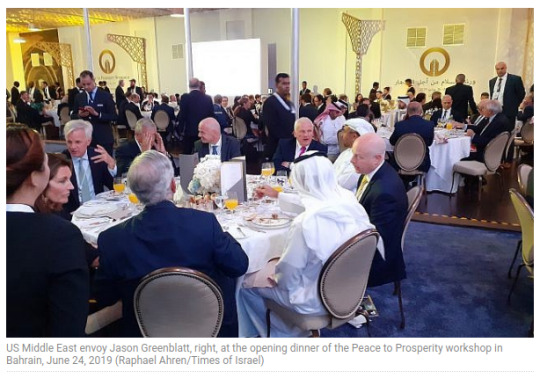
In Abu Dhabi, those keeping kosher were served a kosher-certified gourmet dinner.
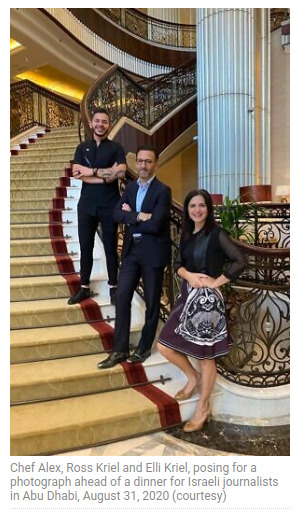
(For starters, there was beetroot salad, artichokes, mushroom tempura, zucchini balls with feta cheese, vegetarian spring rolls with sweet and spicy sauce. This was followed by salmon with lemon butter sauce, filled seabass fillet, sweet potato with fresh truffle and crispy microgreens and garlic baby vegetables. For dessert, there was “lava dark chocolate fondant and dehydrated wild berries.”)
The kosher food was prepared by Elli’s Kosher Kitchen, a Dubai-based catering business owned by Elli Kriel — the wife of Ross Kriel, the president of the UAE’s small Jewish community, who had actually brought a Torah scroll to Abu Dhabi for the occasion.
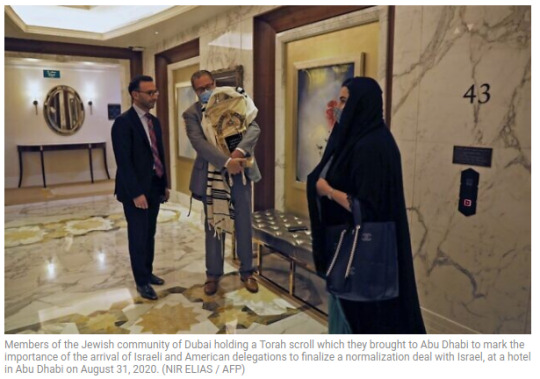
Rabbi Yissachar Krakowski of OU Kosher, the world’s largest kosher certification agency, had flown from Israel to the UAE to facilitate all of the kosher food for the Israeli delegation, including this meal. (Krakowski has experience with kosher catering in the Gulf, having organized kosher meals for the Conference of Presidents of Major American Jewish Organizations when they visited the UAE and Saudi Arabia.)
Wrong
“OK, the bad news first: The State of Israel and the Kingdom of Bahrain are not about to establish diplomatic relations,” I wrote in June 2019, after that gala dinner in Manama. “Not this week, in the immediate aftermath of the US-led Peace to Prosperity economic workshop hosted here, and nor probably in the months, or even years, to come.”
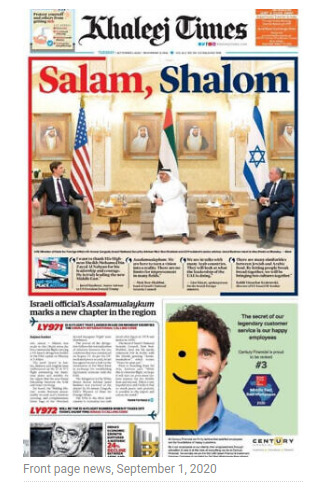
A peace deal with the Palestinians, I asserted at the time, remains the ultimate glass ceiling that needs to be smashed before any Gulf state is ready to normalize ties with Israel.
Monday’s historic nonstop flight from Tel Aviv to Abu Dhabi, and the care and enthusiasm with which Emiratis welcomed us to their country, shows how wrong I was.
16 notes
·
View notes
Text

Politics as an Arena and a Process
by Dannica Batoon
Politics as an arena depends on the location where political behavior occurs. Often, politics happen in the Congress chambers, the President's office, and administrative courts. However, politics take place anywhere.
Social media is not inherently political because people typically use it for personal or private pursuits. Reddit could merely be a discussion website, live streaming site, or a social news aggregation. You don't even need to introduce yourself on Reddit before you could participate in it. Anonymously, you can start an event by telling where it would take place, the date and time, and what would happen or what to bring. People can do this on most social media platforms before technology conglomerate restricted political activities. Previously, they just cracked down disinformation.
Social media was pivotal in mobilizing people for a political cause in two of my examples: the Umbrella Movement and the 2021 Capitol Riot. The purpose of these events was to overthrow a government. The national election was also a reason for mobilization.
On January 6, 2021, Donald Trump tweeted allegations of vote fraud ahead of his rally. He knew that his supporters would walk towards the Capitol building. That was the start of his speech. He added that he would never give up and concede.
Before that, a Reddit community posted threads about the Capitol overthrow if the Congress and former Vice President Mike Pence would validate Biden's victory after an electoral count. When Congress started counting the vote for each state, the mob stormed the Capitol building. The Capitol police evacuated Pence and the lawmakers when the protesters breached the complex. The event injured at least 140 people, and five people died.
Trump supporters organized the deadly riot on Reddit, Twitter, Telegram, Parler (a right-wing website), Gab, TikTok, and TheDonald.win. Trump even urged Qanon, an influential conspiracy theorist, to gather support for the Capitol siege. Qanon blogged about it before January 6 and bragged of bringing thousands of protestors.
In Hongkong, the Hong Kong Federation of Students and Scholarism, a student activist group, and the Occupy Central with Love and Peace movement gathered supporters by digital means.
Twitter reported that 1.3 million tweets about Hong Kong were recorded between September 26-30, the beginning of the Umbrella Movement. Tracy Loh, visiting fellow at the Department of Communications and New Media at the National University of Singapore, told CNBC that social media "was definitely a documenting function, and it also helped in coordinating and mobilizing the protesters, especially when there were several protest sites."
The Arab Spring in Tunisia, Libya, Egypt, Yemen, Syria, and Bahrain did not start on social media, but they contributed to counter-revolution. That is why Arabian governments controlled the activities of citizens in social media. Social media platforms suspended and removed thousands of accounts of political dissidents in Tunisia, Palestine, Egypt, and Syria. Lebanon-based organization SMEX, which advocates for digital rights in the Arab region, published an open letter signed by more than 40 civil organizations, calling on Facebook, Twitter, and YouTube to stop silencing critical voices in the Middle East and North Africa.
Politics also can happen in a schoolyard. Eleven years ago, Mouawiya Syasneh painted graffiti against President Bashar al-Assad. The police kidnapped and tortured the boy, which sparked civil unrest in Deraa. It spread across Syria, which people did not expect even if the Arab Spring was already happening in Tunisia, Yemen, and Egypt.
Now, we go to politics as a process.
Across the world, women are on lower incomes than men. According to UN Women, men's average wages are higher than women's in rural and urban areas. Rural women typically work longer hours than men due to additional reproductive, domestic, and care responsibilities. In Benin and Tanzania, women work 17.4 and 14 hours more than men per week, respectively.
Women have narrowed legal and political rights and are subject to various forms of cultural oppression. In this context, feminist interpretations of political problems contributed to political theory and inspired generations of political thinkers and movements. Kate, Brittany Higgins, and Grace Tame's cases exemplify politics as a process of Feminism.
Australia is currently facing cultural protests against women's discrimination in schools, the federal government, and the overall social sphere in the country.
Just this year, Australia recognized Grace Tame as the Australian of the Year. Tame was a victim of sexual assault by her school teacher. She became vocal about it after being quelled by police authorities and laws. Since then, the media has been exposing sexual assault allegations in schools and the Australian government, helping female victims voice their concerns.
Related to Tame's narrative was the historical rape allegation to Christian Porter and the case of a former Liberal staffer, Britanny Higgins.
Attorney-General Christian Porter allegedly raped his colleague, Kate, when he was 18. Kate became a history professor and suffered from mental problems after Porter's crime. People predicted Kate would be a top government official if Porter did not rape her 33 years ago. Porter, meanwhile, succeeded in the Australian government. Kate took away her life after a prolonged investigation caused by the pandemic. Porter, being the Attorney-General, also prevented the inquiry.
Brittany Higgins, a former ministerial staff, experienced delays that lasted for two years. On March 22, 2019, an adviser of Minister Linda Reynolds raped Higgins in her office. The Finance Department covered up the crime, and the Morisson administration terminated the perpetrator for a wrong cause, a security breach in the Parliament House, to hide the rape incident.
Kate's suicide and Higgin's unsolved case reported by the media triggered Scott Morisson's government to act. Now, Australian women are calling for the protection of women in Australian public policies and laws.
Many girls experienced sexual assault in Australia because sexual consent is not taught early in schools. Students in Sydney advanced their calls for women's protection against sexual perpetrators and sex education in social media, particularly on Instagram, spreading across Australia and made as a media agenda.
According to a political communication and psychology theory, agenda-setting influences policies when an issue becomes dominant in the news and public communication or rhetoric.
In the examples that I have given, you can see the interplay between feminism and media effects, and that's how you explain a political process and develop an original conceptual framework in political science.
#Feminism#Everyday feminism#politics#capitalism#journal#bujo journal#IR#iris west#Political Science nerd#ir event: maskerade#studyblr#studyspo
4 notes
·
View notes
Text
Week Ahead In The News
Richard Hillgrove Founder of 6 Hillgrove PR takes a look at the week ahead.
News diary 9-15 March:
Chinese firm Jingye Group’s acquisition of British Steel is expected to complete on Monday in a deal that could save thousands of steelmaking jobs in the north of England.
Jingye has committed to investing £1.2bn at its new sites in Scunthorpe and Teesside, and the deal marks a significant boost for an industry that has been hit hard in recent years by plant closures and the US-led tariff wars.
Former Scottish First Minister Alex Salmond is due to go on trial at Edinburgh’s High Court after being charged with multiple sex offences.
Salmond faces a total of 14 counts including attempted rape and sexual assault, with all offences alleged to have taken place over a six-year period during his time in office. Salmond denied the charges during a preliminary hearing in November and the trial is expected to wrap up in the first week of April.
A royal reunion takes place at Westminster Abbey when the departing Duke and Duchess of Sussex join The Queen and family at the annual Commonwealth Service.
The event, expected to be the couple’s final public engagement as senior royals, features an address from boxer Anthony Joshua and performances from Rewind hitmaker Craig David and X Factor winner Alexandra Burke.
Former House of Commons speaker John Bercow delivers a keynote speech on Tuesday at a conference to discuss Parliament and Brexit hosted by UK in a Changing Europe.
The speech follows the release of Bercow’s autobiography Unspeakable, which details the thinking behind the controversial adjudications he made as Speaker during Parliament’s debates and votes on Brexit.
Idaho, Michigan, Mississippi, Missouri, Washington and North Dakota hold primaries to choose their state’s Democratic presidential nominee. Vermont Senator Bernie Sanders fell into second place following Joe Biden’s surprise resurgence on Super Tuesday; this week’s contests will see whether the former Vice President can sustain his newfound “joementum”.
Mike Bloomberg and Elizabeth Warren have both dropped out following a series of disappointing performances, making it now a two-man race to the convention.
On Wednesday, Rishi Sunak presents his first Budget just 27 days after replacing Sajid Javid as Chancellor with a less-than-ringing endorsement from his former boss.]
Sunak’s task of delivering on Conservative manifesto pledges within existing fiscal rules, which the influential IFS think tank has suggested would be impossible without tax rises, has been illustrated in recent days by a row over fuel duty. Some of the more difficult choices may therefore be saved for later in the year, with this Budget expected to be the first in a trio of fiscal events for the Chancellor.
Alongside the Budget, the Office for Budget Responsibility publishes a forecast for the UK’s public finances which was delayed from last year by Boris Johnson’s decision to hold an election. The forecast is likely to repeat last year’s notes of caution around weak growth and Brexit-related uncertainty, and may also factor in the potential impact of a global coronavirus outbreak, all of which could leave the Chancellor with little wriggle room in future fiscal statements.
To comply with its statutory requirement to produce two forecasts each year, the OBR also releases a second, updated forecast on Friday in something of a double swansong for the departing Robert Chote.
Disgraced Hollywood producer Harvey Weinstein faces up to 25 years in prison at his sentencing in New York, after being found guilty of third-degree rape and a criminal sex act at the conclusion of a lengthy trial last month.
The hearing won’t mark the end of the Weinstein saga: he reportedly plans to appeal the conviction, despite being found not guilty of the more severe charges brought against him, and he also faces multiple sexual assault charges in Los Angeles.
The Independent Inquiry into Child Sexual Abuse publishes its report on the nature and extent of the use of the internet to facilitate abuse on Thursday.
Tech giants including Apple, Facebook, Microsoft, and Google all gave evidence to the inquiry in secret as part of its internet investigation strand, amid concerns that public evidence could help offenders evade detection as well as criticism over the platforms’ abilities to protect children.
In Parliament, members of the Digital, Culture, Media and Sport Committee grill outgoing BBC director-general Tony Hall (pictured) and chairman David Clementi at an evidence session on the licence fee.
The executives are expected to face questions about Hall’s decision to step down early, the planned overhaul of the BBC’s workforce and changes to the licence fee payments for over-75s, as well as the corporation’s recent equal pay tribunals. A Government consultation into decriminalising the non-payment of the licence fee is ongoing.
The European Central Bank’s monetary policy committee meets in Frankfurt, with speculation rife that the ECB will follow the US Federal Reserve’s lead from last week and announce measures to counteract the economic effects of the coronavirus outbreak in the eurozone.
ECB President Christine Lagarde has signalled potential actions, and the issue is sure to be addressed at her post-meeting press conference.
Friday sees the publication of findings from Northern Ireland’s Renewable Heat Incentive (RHI) inquiry. The inquiry was established by the Northern Ireland Executive in January 2017 and investigated its design, governance, implementation, and operation.
Furore surrounding the scheme’s management prompted the resignation that same month of Deputy First Minister Martin McGuinness and the subsequent collapse of the Stormont government, which wasn’t restored until this January, ultimately allowing both abortion and same-sex marriage to be decriminalised in the country.
The Air Accidents Investigation Branch publishes a final report into the January 2019 plane crash that killed Argentine footballer Emiliano Sala and pilot David Ibbotson.
A preliminary report last year found that Ibbotson was not licensed to carry paying passengers, sparking calls for a clampdown on celebrities using so-called “grey” charter flights as unlicensed air taxis.
Former Liberal Democrat leader Jo Swinson speaks at the party’s Spring Conference on Saturday. The conference is the first major gathering of members since the Lib Dems’ heavy defeat in the December election, and follows the resignation of former leader Lord Steel following the Independent Inquiry into Child Sexual Abuse’s accusation that he had “turned a blind eye” to accusations of child abuse against late MP Cyril Smith in the 1970s.
Former US Secretary of State Hillary Clinton is, at time of writing, scheduled to speak at the South by South West Festival, where she is likely to address the Democratic presidential primary.
SXSW organisers are insisting the festival will go ahead, despite several high-profile tech and media companies – including Facebook, Twitter, TikTok, and Netflix – withdrawing from the event, and an online petition to have it cancelled over concerns about the spread of coronavirus.
French voters go to the polls on Sunday for the first round of municipal and mayoral elections, despite government efforts to limit large gatherings in another attempt at coronavirus containment. President Emmanuel Macron’s En Marche party is steeling itself for disappointing results, after the government pushed through controversial pension reforms despite widespread protests.
The party’s hopes of taking the powerful Paris mayoralty from incumbent Socialist Anne Hidalgo were dented when they had to replace their candidate, Benjamin Griveaux, over a sex scandal a month before the vote.
The 2020 Formula One season gets underway as Melbourne hosts the Australian Grand Prix. The new season could see Lewis Hamilton draw level with Michael Schumacher’s seven world championship wins, but, as with most current events, faces disruption from the coronavirus outbreak.
The Chinese Grand Prix scheduled for April has already been postponed and there are growing concerns that races in Vietnam, Italy, and Bahrain could follow suit. Organisers are determined for the Australian GP to go ahead, despite concerns over whether travel restrictions could end up blocking Ferrari’s team from entering the country.
This information is provided in association with Foresight News.
1 note
·
View note
Text
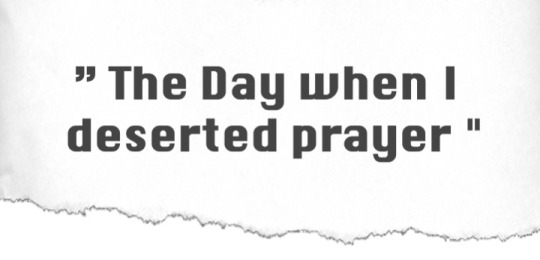
“ The secret in true divine prayer is not in changing the world 🌎; it’s in changing us then we change the world 🌎 .”
I was very young when all types of thoughts chased us in every place, every book 📖, every discussion.
The high school days were the most difficult days; they were the days of confusion, doubts, loss and evading school; being in man-made intellectual schools.
Those doctrines snatched me one by one and I was inspired by the most renowned western intellectuals.
Being influenced, I retreated for a long time and meditated the German doctrines albeit my young age and being well-read in English!
However, the English interpretations for the German writers like, Goethe Schiller, kant, Nietzsche and Rilke fascinated me!!
Then I got to know Arthur Schopenhauer who inculcated the Nietzsche’s thoughts in me about the prime of power and the justice of strength and tyranny; it was like he was giving a glad tiding about a new religion!
Nietzsche drew me closer to his justifications and hard reasonings;they were like climbing Bavaria Mountains,the peak of which he terminologically called “The High Will”After that,he tossed me to the shores of Bertrand Russell,the mathematical materialist ascetic
Then, I lovingly delved in the Fabianism thought with Bernard Shaw in his serious demeanor and attitude till I joined Angels in his monasticism.
Those thoughts misled and took me away from the spirit connected with heaven, where certitude is everything. Where faith is a faraway shining sun but it was closer to you than any other element or thing!
Because it’s the energy of Existence!
I really deviated a lot and became an overbearing transgressing individual due to my profuse confused knowledge and books 📚.
I thought that at my early age I had accumulated the magic of all sciences as if I had been the alchemist of knowledge.
Never did I return to read the Islamic books 📚 in exegesis, jurisprudence, Hadith and Arabic literature which I used to pillow or use as a pillow before I was overcome by sleep 😴 !!
I dusted off on myself what I thought at that time was full of the dust of the bygone/past days olden dark history; thinking that I was heading towards the glowing lights of human minds either in history and that current time ( so I thought ).
Then, I deserted/forsook truly divine prayers!My Arabic language teacher who was from Gaza,Palestine 🇵🇸, may Allah have mercy on his soul, was a pious man, very wise man who preferred me over other students due to my avid reading habit and distinction in Arabic.
Later, we had a very strong friendship relationship and strange enough it was a disturbed one too.
That relationship continued till I was hijacked by the existentialism thoughts; it was my first slippery roads towards all philosophies.
He would stand against my deviation and constantly warn me. He would say,“ You aren’t in an age that could judge on the world🌎neither are you to judge your nation knowledge or other nations!
Go back to the water spring and drink from it and strengthen yourself;
Then you may take from other springs, taste some of them and know their ingredients but you will not swallow them.”
You will have your own strong taste based on your strong knowledge, your religion and culture that have permeated the recesses of you; They will prevent you from that ( meaning from allowing it/them to enter your body).
Unfortunately, I continued to transgress and I became overbearing; I felt that a glowing tide or wave 🌊 took me faraway from him leaving for him all the seas of darkness!!
On the new road of materialism,I at the age of 17 started writing articles to a Lebanese magazine titled “AlJumhoor” meaning the populace.
They thought I was a very important person in my country, they even addressed me as such!! They transmitted money for me.
Then, I started writing for an English magazine published in Bahrain 🇧🇭. under a pseudo name was the “ The Free Intellectual”.
My writings would reveal my inner feelings from knowledge and books 📚 I imbibed for years; never raised my heads from them; hopping from a book to another!
I was attracted by the astrology, humanities, historical fossils, medicine and geography!
I would read for scholars whom I’d make sure that they weren’t spiritualists so that they would not confuse me with abstract thoughts that aren’t materially proven!!
Journals profusely started opening up for me and my writings; while still in high school, I started writing ✍ a lot for newspapers and journals in Lebanon 🇱🇧, kuwait 🇰🇼, Iran 🇮🇷, Bahrain 🇧🇭, USA 🇺🇸!
I was mesmerized by and in love with myself!!
I would arrogantly look at my teacher!He sternly asked me,“ Why have stopped praying?”I mockingly replied, “ Does prayer change the world 🌎?”He answered me with a reply that took me off tangent and shook my sobriety ( that is if I had one any way).
He said, “ Yes, prayer doesn’t change the world 🌎, but it changes us to change the world 🌎!”
Alas, I arrogantly fought myself despite this horrific rocking statement, I continued wallowing in in my misguidance!!
Years passed by, I returned home where there was no tolerance by my family for being lazy in performing prayers or for going to the mosque;my father would make his going to the mosque a radiating atmosphere.
My mother would wake us up before even the call was announced for prayer! I heavily dragged myself to go for prayer!!!😡
Then, there came that day when I became extremely sick 🤕; the Doctor agonizingly told me, “ Najeeb, you are certainly going to die in 9 months!!😱
I was in the coastal Tacoma, USA 🇺🇸 I alone travelled there; I went to the greenery hill; I saw the expansive huge ocean 🌊 in front of me; I was there and nothing was there except me, the sky 🌌, the water 💧; and death and life”!
I asked myself, “ Should or must I change something?”
I contemplated deeper; tears 😭 started to well-up in my eyes 👀 and dripped💧 down my face!!
I imagined the tears 😭 vaguely covered a wide area of the ocean 🌊 in a mirage and august way!!
Suddenly, the horrific rocking statement said by the Arabic Gazan teacher popped up in my head,
” Prayer changes us and we then change the world 🌎.”
I hurriedly went to where I resided and cabled the statement to my teacher 👨🏫 without any introductions or conclusions!!!
He replied by saying,
“ Allah has regained you or got you back, live peacefully!!”
The best prayer that made a very powerful spiritual impact on me was the one performed in Tacoma at the Atlantic shorelines; and it was there that I rediscovered myself.
I found that the Truth and its true meaning was up there in Heaven and not on this earthly life!!
By the way, I haven’t died yet!
________________________________
Written By @najeebzamil
Translated by @unlimited_abu Khalid Al-Dossary
____________________
Source: Iqtisadiah
Monday September 17,2007
Volume 5089

4 notes
·
View notes
Text
The Arab Spring
The Arab Spring was a series of pro-democracy uprisings that enveloped several largely Muslim countries, including Tunisia, Morocco, Syria, Libya, Egypt and Bahrain. The events in these nations generally began in the spring of 2011, which led to the name. However, the political and social impact of these popular uprisings remains significant today, years after many of them ended. What Is the Arab Spring you may ask? The Arab Spring was a loosely related group of protests that ultimately resulted in regime changes in countries such as Tunisia, Egypt and Libya. Not all of the movements, however, could be deemed successful—at least if the end goal was increased democracy and cultural freedom.In fact, for many countries enveloped by the revolts of the Arab Spring, the period since has been hallmarked by increased instability and oppression.Given the significant impact of the Arab Spring throughout northern Africa and the Middle East, it’s easy to forget the series of large-scale political and social movements arguably began with a single act of defiance. The Arab Spring began in December 2010 when Tunisian street vendor Mohammed Bouazizi set himself on fire to protest the arbitrary seizing of his vegetable stand by police over failure to obtain a permit. Bouazizi’s sacrificial act served as a catalyst for the so-called Jasmine Revolution in Tunisia.The street protests that ensued in Tunis, the country’s capital, eventually prompted authoritarian president Zine El Abidine Ben Ali to abdicate his position and flee to Saudi Arabia. He had ruled the country with an iron fist for more than 20 years. Activists in other countries in the region were inspired by the regime change in Tunisia—the country’s first democratic parliamentary elections were held in October 2011—and began to protest similar authoritarian governments in their own nations.The participants in these grassroots movements sought increased social freedoms and greater participation in the political process. Notably, this includes the Tahrir Square uprisings in Cairo, Egypt and similar protests in Bahrain.However, in some cases, these protests morphed into full-scale civil wars, as evidenced in countries such as Libya, Syria and Yemen. While the uprising in Tunisia led to some improvements in the country from a human-rights perspective, not all of the nations that witnessed such social and political upheaval in the spring of 2011 changed for the better.Most notably, in Egypt, where early changes arising from the Arab Spring gave many hope after the ouster of President Hosni Mubarak, authoritarian rule has apparently returned. Following the controversial election of Mohamed Morsi in 2012, a coup led by defense minister Abdel Fattah el-Sisi installed the latter as president in 2013, and he remains in power today. In Libya, meanwhile, authoritarian dictator Colonel Muammar Gaddafi was overthrown in October 2011, during a violent civil war, and he was tortured (literally dragged through the streets) and executed by opposition fighters. Video footage of his death was seen by millions online.However, since Gaddafi’s downfall, Libya has remained in a state of civil war, and two opposing governments effectively rule separate regions of the country. Libya’s civilian population has suffered significantly during the years of political upheaval, with violence in the streets and access to food, resources and healthcare services severely limited. This has contributed, in part, to the ongoing worldwide refugee crisis, which has seen thousands flee Libya, most often by boat across the Mediterranean Sea, with hopes of new opportunities in Europe. Similarly, the civil war that began in Syria in the aftermath of the Arab Spring lasted for several years, forcing many to leave the country to seek refuge in Turkey, Greece and throughout Western Europe. For a time, the militant group ISIS had declared a caliphate—a nation governed by Islamic law—in northeastern Syria.The group executed thousands of people, and many others fled the region in fear of their lives.Yet, although ISIS has largely been defeated in Syria, the oppressive regime of long-time dictator Bashar al Assad remains in power in the country.In addition, the ongoing civil war in Yemen can also be traced to the Arab Spring. The country’s infrastructure has suffered significant damage, and the conflict has devolved into tribal warfare.And in Bahrain, peaceful pro-democracy protests in the capital Manama in 2011 and 2012 were violently suppressed by the government of King Hamad bin Isa Al Khalifa. Officially, the country has a constitutional monarchy form of government, but personal freedoms remain limited.The plight of the Bahraini people was dramatically portrayed in the documentary Shouting in the Dark, which was released in 2012.
1 note
·
View note
Text
How the Arab Spring changed the Middle East and North Africa forever
How the Arab Spring changed the Middle East and North Africa forever
Mohamed-Ali Adraoui, Fondation Maison des Sciences de l’Homme (FMSH)
Ten years after people rose up against their leaders in country after country around the Middle East and North Africa, from Tunisia to Egypt, Yemen and Bahrain, what can we say about how society, politics and religion have changed in the region?
To put it mildly, the social, cultural, religious, political and strategic events…
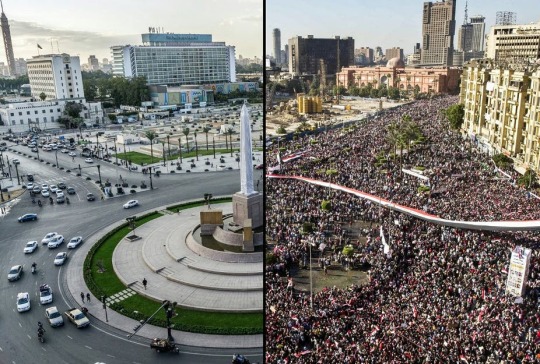
View On WordPress
#Arab Spring#Arabs exiting violence#Corepaedia#corepaedianews#Egypt#FMSH#Iraq#Lebanon#MENA#Middle East#North Africa#Popular revolt#Tunisia#كوربيديا#كوربيديا للاخبار
0 notes
Text
Bahrain Spring of Culture
In recent decades, the government organizations of Bahrain have worked toward making its national arts program as robust as its oil industry. The Spring of culture Festival, held every march in the capital city of Manama, helps fulfill this cultural mission and promotes tourism to the country. Thanks to its reputation as a meeting place between the East and the West, Spring of Culture is able to attract performers from all over the world. National, regional, and international artists converge on Manama to perform poetry readings, music, theater, and dance.
0 notes
Note
I'm genuinely not saying this to be rude but I don't even understand what culture Western Europeans, Americans, etc. speak of when they thrust it into their arguments like as someone who is not from any of those countries but has had the privilege to travel for school at certain points... they are so similar. I can look at something and immediately be able to tell "Oh yeah that's Western." In my opinion, and as I've actually seen in my own country, I feel like the "Westernization" of (1/2)
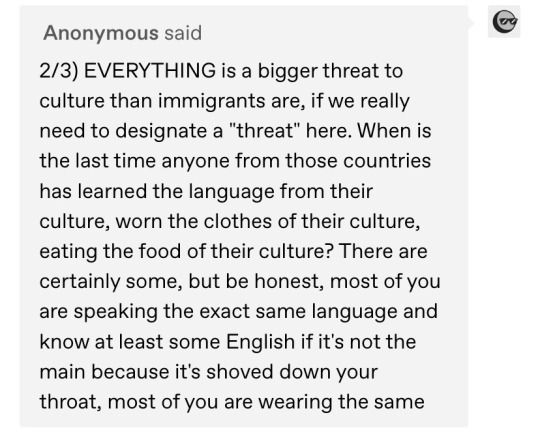
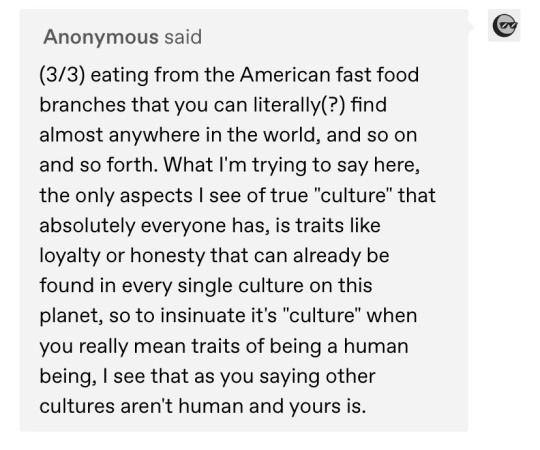

i don’t fully understand the last bit about loyalty and honesty, i think when ppl refer to cultures they refer to like clothing, language, practices, religion to some degree, and the like. people often neglect what is valued within each culture, such as traits like honesty or loyalty (both also being somewhat subjective), but i agree that there are far more major threats to loss of culture than immigrants. in germany, the dialects are being less and less spoken & what is persisting is hochdeutsch (it’s like the standard german everyone learns basically) and on top of that, “denglish” (german with some english mixed into it) is becoming more widely spoken. in france, theres also a risk of a loss of dialects. in both cases it’s not about immigrants but rather the dominant form of the language in the country & what is frequently taught in schools ends up being used more. many of our cultures are becoming more & more americanised also. my culture as a bahraini is pretty small and ig rare since there’s so few of us. with many bahrainis having left bahrain after the arab spring, and many having been exiled and imprisoned, the naturalisation of foreign sunni muslims which has been done by the govt for quite some time bc they want to change bahrain’s demographics, and with the americanisation of our country as well, a lot of things unique to us seem to be slowly dying out. out of my cousins, i speak the best arabic (and im not even as good as the previous generations like my mom & her siblings or my dad’s family) and i recall reading stuff about how arabic is becoming less & less spoken within the arab world. a lot of our cultures in the middle east have already lost aspects due to islamisation as well. i definitely see a larger chance of eastern cultures being lost than western ones, but in both cases i see the biggest root & influence on our cultures being not immigrants, but Americanisation as well as the governments’ lack of care about our cultures being lost or retained. at the same time, the most important aspects of the western cultures are doing pretty well from what ive seen. biggest thing being lost right now is dialects it seems. can’t say the same for bahraini culture or other cultures of persecuted peoples 🤦🏾♀️
7 notes
·
View notes